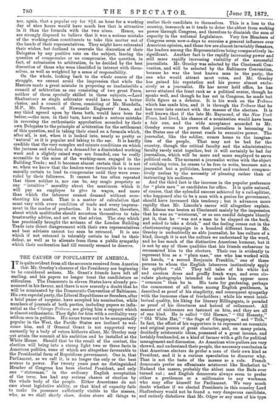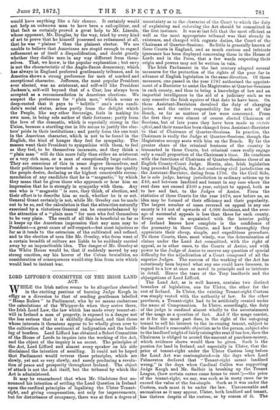that there neither is, nor can be, any magic propriety
or And the third fact is the increase in the popular preference any " intuitive " morality about the maximum which it for "plain men" as candidates for office. It is quite natural, will pay an employer to give in wages, and more of course, that the splendid success achieved by a rail-splitter, than which the labourer cannot demand without over- who happened also to be a man with a genius for government, shooting his mark. That is a matter of calculation that should have increased this tendency ; but it advances more must vary with every condition of trade and every improve- rapidly than Mr. Lincoln's career will altogether explain. meat in the modes of production. It is a matter, therefore, Mr. Adams was beaten at Cincinnati mainly by the impression about which multitudes should accustom themselves to take that he was an "aristocrat," or as one candid delegate bluntly trustworthy advice, and act on that advice. The step which put it, that he "was not a man to be slapped on the back, has practically brought the artisans of the London Building and asked to take a drink," and the feeling comes out in the Trade into direct disagreement with their own representatives electioneering campaign in a hundred different forms. Mr. and best advisers cannot too soon be retraced. It is one Greeley is undoubtedly an able journalist, he has culture of a which if not retraced is tolerably certain to lead to their kind, though it is not the culture we understand by the word, defeat, as well as to alienate from them a public sympathy and he has much of the distinctive American humour, but it which their moderation had till recently seemed to deserve, is not by any of these qualities that his friends endeavour to recommend him to the electors. Their cue is evidently to represent him as a "plain man," one who has worked with
• earnestly by a body of voters hitherto silent, Mr. Greeley may decidedly aristocratic ideas, possessed of a great income, and -yet attain the summit of his ambition and be installed at the lavishly freehanded, as a kind of farmer with a gift for political White House. Should that be the result of the contest, the management and discussion. As American wire-pullers are very election will bring into a strong light two or three facts in shrewd, and understand their people, the necessary conclusion is American politics, none of which are altogether favourable to that American electors do prefer a man of their own kind as the Presidential form of Republican government. One is, that President, and it is a curious speculation to discover why. Parliament, as we call it, is no longer the only or the best That is not the taste of the masses as a rule. French avenue to power. For twenty years past no distinguished democrats prefer an effeminate aristocrat like Rochefort to*4- Member of Congress has been elected President, and only Nadaud the mason, probably the ablest man the Reds ever one "statesman," in the ordinary English acoeptation turned oat ; and English democrats always seem to prefer of the term, has had any serious chance of election by either a gentleman or a millionaire to any workman the whole body of the people. Either Americans do not who may offer himself for Parliament. We very much care about legislative ability, or that kind of capacity fails doubt whether if we elected Presidents in this country Lord to make its possessor sufficiently visible to the masses, Shaftesbury would not be found a very dangerous candidate, who, as we shall shorly show, desire above all things to and entirely disbelieve that Mr. Odger or any man of his type
would have anything like a fair chance. It certainly would uncertainty as to the character of the Court to which the duty
not help an unknown man to have been a rail-splitter, and that fact as certainly proved a great help to Mr. Lincoln, whose opponent, Mr. Douglas, by the way, tried by every kind of art to prove that he himself possessed no refinement at all, that he was " plainer " than the plainest elector. We are unable to believe that Americans are stupid enough to regard refinement as of itself a disqualification, and doubt greatly whether they dislike men in any way different from them- selves. That, we know, is the popular explanation ; but envy is not the characteristic of the Anglo-Saxon democracy, which has always in England preferred gentlemanly tribunes, and in America shows a strong preference for men of marked and exceptional character. Jefferson, the most popular President ever elected, was an aristocrat, and self-will like President Jackson's, self-will beyond that of a Czar, has always been accepted as a recommendation in American elections. We suspect the preference for "plain men," which seems so deep-rooted that it pays to " belittle " one's own candi- date's social status, arises partly from the delight which the People, like any other Sovereign, feels in making its own men, in being sole author of their fortunes; partly from the love of the dramatic, which is especially strong in the Union, because a startling rise in life seems to justify the elec- tors' pride in their institutions ; and partly from the one trait in the American character, which is not to be found in the English, the kind of hunger they feel for sympathy. The masses want their President to sympathise with them, to feel as they feel, to be themselves incarnate, and they think a "plain man" will do this more fully than either an aristocrat or a very rich man, or a man of exceptionally large culture. They are conscious of this in some degree themselves, and their politicians have invented a word to express the quality the people desire, declaring as the highest conceivable recom- mendation of any candidate that he is "magnetic," by which they mean that he gives those who approach or hear him an impression that he is strongly in sympathy with them. Any one who is " magnetic " is sure, they think, of election, and their effort is to describe him as such, whether he is or not. General Grant certainly is not, while Mr. Greeley can be made out to be so, and the calculation is that the attraction naturally exercised by a victorious General can be counterbalanced by the attraction of a "plain man" for men who feel themselves to be very plain. The result of all this is beneficial so far as it keeps up the American impression that any man may be President—a great cause of self-respect--but most injurious so far as it tends to the ostracism of the cultivated and refined, and to the election of men like Mr. Greeley, who from want of a certain breadth of culture are liable to be suddenly carried away by an impracticable idea. The danger of Mr. Greeley at the White House would be, that if suddenly moved by any strong emotion, say his horror of the Cuban brutalities, no consideration of consequences would stop him from acts which would lead to instant war.



































 Previous page
Previous page